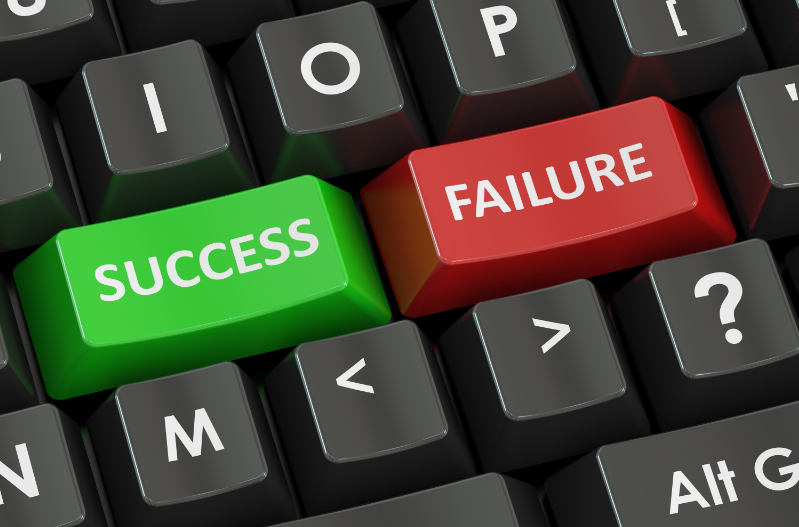
Simply put, failure is a lack of success. When we fall short of our goals or expectations for ourselves, we fail.
For many of us, just reading the last sentence may cause anxiety.
Our society views failure negatively; we’re pushed to succeed, sometimes over-exerting ourselves to do so.
But failure is actually very helpful (and totally normal) if we choose to embrace it.
This article talks about how to deal with failure, and how it can help us grow.
5 Tips for Dealing with Failure
1. Accept Feelings of Failure
Because many of us have a deeply ingrained desire for success, failure may feel terrifying.
We may experience shame, sadness, anger, defeat, guilt, etc.
Whatever emotions we have, we should allow ourselves to experience them.
Suppressing emotions doesn’t mean they don’t exist. It just robs us of the chance to face them head-on.
When we try to accept uncomfortable emotions, we learn that we’re capable of managing them.
This doesn’t mean that we’ll enjoy failing, just that it’s not the end of the world if we do.
2. Learn Healthy Coping Mechanisms
After we’ve accepted our emotions, we need to practice healthy coping mechanisms to deal with them.
Our arsenal of healthy coping mechanisms can include both reactive and proactive tools, e.g.:
- Exercise
- Taking a break
- Deep breathing
- Journaling
- Establishing a support system before working on a new project
- Creating a plan for how we’ll respond to failure if it happens
It’s important to limit unhealthy coping mechanisms like yelling, using alcohol/drugs, avoidance, etc. This tends to only provide temporary relief and may cause emotional and physical harm.
3. Don’t Identify with Failure
We might believe that we’re only as good as our accomplishments.
But this view of ourselves is unsustainable and unrealistic, as we will fail at some point.
When we do, we might view ourselves as failures, rather than someone who simply failed at something.
When our self-identity relies on being successful, we don’t give ourselves room for error.
For example, if we’re trying a new kid-friendly recipe for dinner and it goes horribly, we may label ourselves as bad caregivers/homemakers.
Making overgeneralizations like this will lower our self-confidence.
Instead, we should try to separate our failures from our identities.
When we realize that failure is a natural part of any new (or existing) process, and not caused by personal flaws, it gives us the confidence to keep trying.
4. Celebrate the Fails
From the time we’re young, we’re taught to celebrate our wins.
From little league home runs to high SAT scores to big promotions, we praise ourselves when we succeed (and deservedly so).
But rarely do we cheer ourselves on when we fail.
This concept is common in professional settings but applies to life in general, too.
To be clear, this refers to times when we gave our best efforts but didn’t reach our desired results.
It doesn’t apply to situations where we didn’t try at all, even when all necessary resources were available.
Maybe we tried to be a green-thumbed gardener but killed all our plants instead.
We can take a light-humored approach to discuss it with friends, make note of gardening methods that didn’t work, or create a Failure Award for the most shriveled plant.
The point is to not take failure so seriously and learn to accept it openly.
5. Find Others Who’ve Failed
We may feel like no one else in the world has experienced failure like us. But obviously, this isn’t true.
Connecting with others who’ve failed at the same things we have can provide reassurance and motivation to keep trying.
We should seek out people who are currently going through the same failure as us, and those who’ve overcome it.
Talking to those in the same boat helps us feel less alone and gives us someone to brainstorm solutions with.
Connecting with people who’ve reached our goal provides proof that success is possible, which boosts encouragement and hope.
These people can also give us valuable insights about achieving our goal, as they’ve done it already (and probably failed in the process).
6. Learn from Failure
Failure teaches us what not to do.
Ultimately, this helps us eliminate pathways that won’t lead to success.
We can use failure as a constructive tool to examine what went wrong and why.
Then, we can think of alternative ideas that could be more useful and repeat the process of elimination and exploration until we’re successful.
Failure hurts.
But it’s also an opportunity to face our emotions head-on, build healthy coping mechanisms and learn from our mistakes.
When we separate ourselves from our missteps and connect with others who share our experiences, failure can become a powerful tool for future success.
So, fail hard and do it often. Growth awaits!



